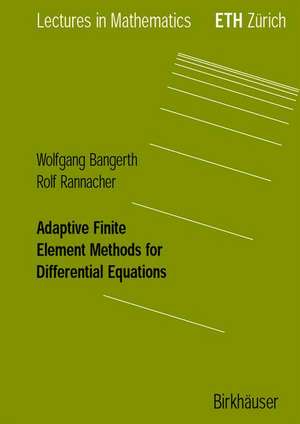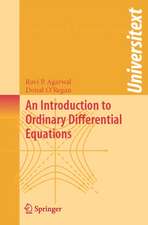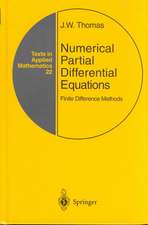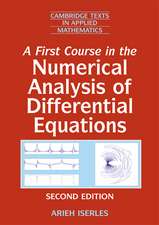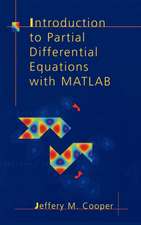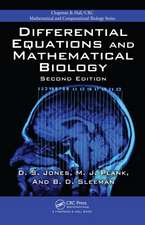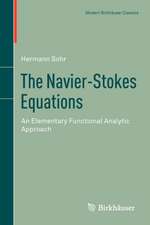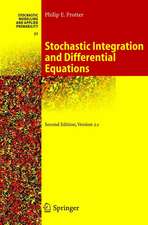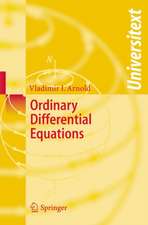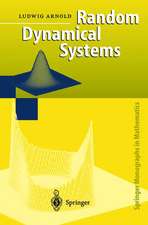Adaptive Finite Element Methods for Differential Equations: Lectures in Mathematics. ETH Zürich
Autor Wolfgang Bangerth, Rolf Rannacheren Limba Engleză Paperback – 23 ian 2003
Din seria Lectures in Mathematics. ETH Zürich
-
 Preț: 319.43 lei
Preț: 319.43 lei -
 Preț: 453.98 lei
Preț: 453.98 lei -
 Preț: 482.56 lei
Preț: 482.56 lei -
 Preț: 348.77 lei
Preț: 348.77 lei -
 Preț: 379.30 lei
Preț: 379.30 lei -
 Preț: 383.93 lei
Preț: 383.93 lei -
 Preț: 378.71 lei
Preț: 378.71 lei - 15%
 Preț: 492.73 lei
Preț: 492.73 lei -
 Preț: 381.98 lei
Preț: 381.98 lei -
 Preț: 381.21 lei
Preț: 381.21 lei -
 Preț: 345.12 lei
Preț: 345.12 lei -
 Preț: 381.43 lei
Preț: 381.43 lei - 18%
 Preț: 735.84 lei
Preț: 735.84 lei - 15%
 Preț: 491.75 lei
Preț: 491.75 lei -
 Preț: 414.80 lei
Preț: 414.80 lei -
 Preț: 395.25 lei
Preț: 395.25 lei -
 Preț: 345.45 lei
Preț: 345.45 lei -
 Preț: 447.03 lei
Preț: 447.03 lei - 15%
 Preț: 493.37 lei
Preț: 493.37 lei -
 Preț: 380.45 lei
Preț: 380.45 lei -
 Preț: 350.24 lei
Preț: 350.24 lei -
 Preț: 347.15 lei
Preț: 347.15 lei -
 Preț: 382.36 lei
Preț: 382.36 lei -
 Preț: 383.71 lei
Preț: 383.71 lei -
 Preț: 447.62 lei
Preț: 447.62 lei -
 Preț: 381.98 lei
Preț: 381.98 lei - 18%
 Preț: 907.11 lei
Preț: 907.11 lei
Preț: 385.84 lei
Nou
Puncte Express: 579
Preț estimativ în valută:
73.84€ • 80.18$ • 62.02£
73.84€ • 80.18$ • 62.02£
Carte tipărită la comandă
Livrare economică 22 aprilie-06 mai
Preluare comenzi: 021 569.72.76
Specificații
ISBN-13: 9783764370091
ISBN-10: 3764370092
Pagini: 220
Ilustrații: VIII, 208 p. 151 illus.
Dimensiuni: 170 x 244 x 12 mm
Greutate: 0.36 kg
Ediția:2003
Editura: Birkhäuser Basel
Colecția Birkhäuser
Seria Lectures in Mathematics. ETH Zürich
Locul publicării:Basel, Switzerland
ISBN-10: 3764370092
Pagini: 220
Ilustrații: VIII, 208 p. 151 illus.
Dimensiuni: 170 x 244 x 12 mm
Greutate: 0.36 kg
Ediția:2003
Editura: Birkhäuser Basel
Colecția Birkhäuser
Seria Lectures in Mathematics. ETH Zürich
Locul publicării:Basel, Switzerland
Public țintă
ResearchRecenzii
"Most graduate students in engineering and physical sciences should be able to handle the material without excessive difficulty. The presentation is very much a tutorial approach promoting a hands-on experience, reinforced with practical exercises at the end of each chapter, aimed towards practitioners.... [The] present book provides a gentler introduction for the beginning graduate student or nonspecialist practitioner."
— SIAM Review
— SIAM Review
Textul de pe ultima copertă
These Lecture Notes discuss concepts of `self-adaptivity' in the numerical solution of differential equations, with emphasis on Galerkin finite element methods. The key issues are a posteriori error estimation and it automatic mesh adaptation. Besides the traditional approach of energy-norm error control, a new duality-based technique, the Dual Weighted Residual method for goal-oriented error estimation, is discussed in detail. This method aims at economical computation of arbitrary quantities of physical interest by properly adapting the computational mesh. This is typically required in the design cycles of technical applications. For example, the drag coefficient of a body immersed in a viscous flow is computed, then it is minimized by varying certain control parameters, and finally the stability of the resulting flow is investigated by solving an eigenvalue problem. `Goal-oriented' adaptivity is designed to achieve these tasks with minimal cost.
At the end of each chapter some exercises are posed in order to assist the interested reader in better understanding the concepts presented. Solutions and accompanying remarks are given in the Appendix. For the practical exercises, sample programs are provided via internet.
At the end of each chapter some exercises are posed in order to assist the interested reader in better understanding the concepts presented. Solutions and accompanying remarks are given in the Appendix. For the practical exercises, sample programs are provided via internet.
Caracteristici
treatment of general nonlinear problems not restricted to energy-norm error estimation: goal-oriented mesh adaptivity many practical applications from structural and fluid mechanics, including eigenvalue problems and optimization
